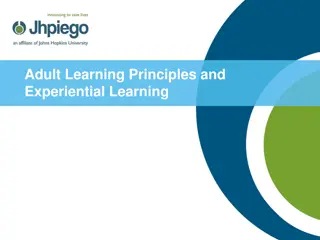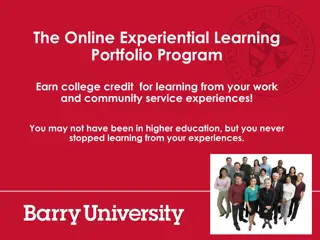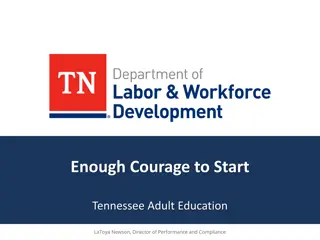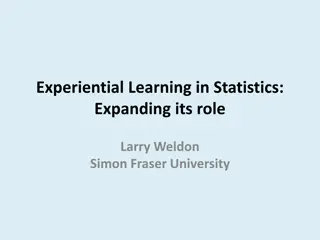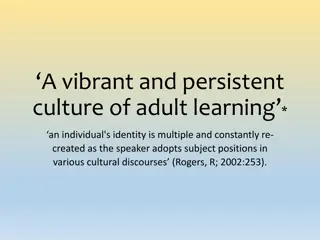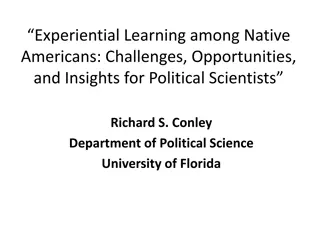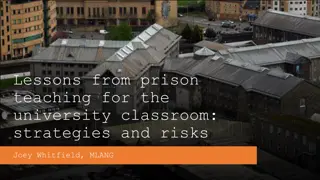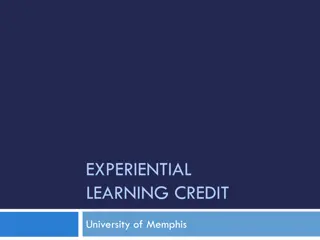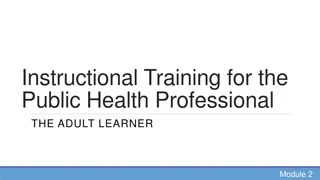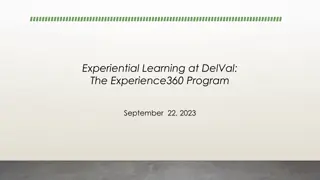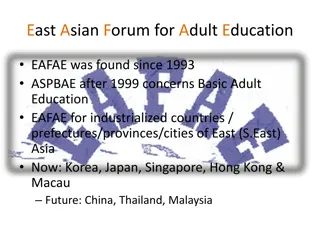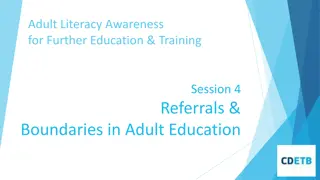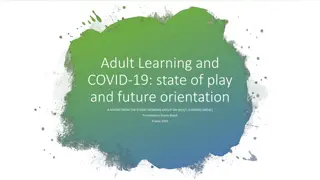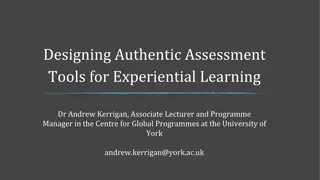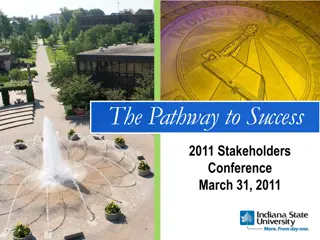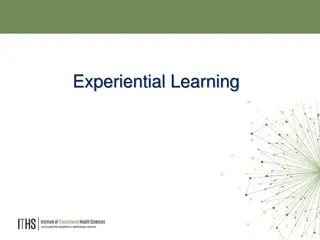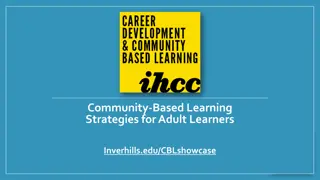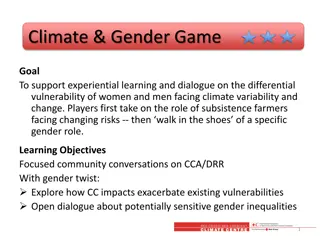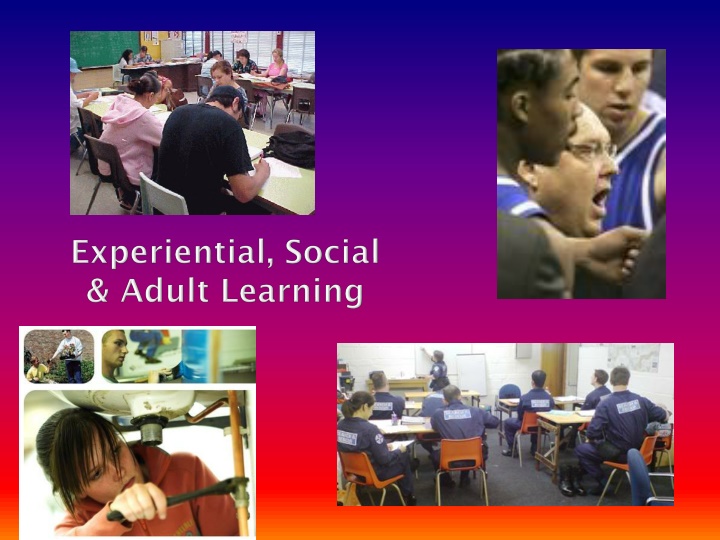
Importance of Experiential Learning Models in Adult Education
Explore the significance of experiential learning models, characteristics of adult learning, and the concept of andragogy. Understand the role of social learning theories and how experiential learning shapes our perceptions. Delve into the differences between adult and child learners, and ways to enhance adult learning through teaching strategies.
Download Presentation

Please find below an Image/Link to download the presentation.
The content on the website is provided AS IS for your information and personal use only. It may not be sold, licensed, or shared on other websites without obtaining consent from the author. If you encounter any issues during the download, it is possible that the publisher has removed the file from their server.
You are allowed to download the files provided on this website for personal or commercial use, subject to the condition that they are used lawfully. All files are the property of their respective owners.
The content on the website is provided AS IS for your information and personal use only. It may not be sold, licensed, or shared on other websites without obtaining consent from the author.
E N D
Presentation Transcript
Aims To explore the importance of experiential learning models To consider characteristics of learning in adults and in particular the concept of andragogy To recognise the importance of social learning theories
Experiential Learning Experience is, for me, the highest authority. The touchstone of validity is my own experience. No other person's ideas, and none of my own ideas, are as authoritative as my experience. It is to experience that I must return again and again, to discover a closer approximation to truth as it is in the process of becoming in me. Neither the Bible nor the prophets - neither Freud nor research --neither the revelations of God nor man - can take precedence over my own direct experience. My experience is not authoritative because it is infallible. It is the basis of authority because it can always be checked in new primary ways. In this way its frequent error or fallibility is always open to correction. Carl Rogers (from On Becoming a Person', 1961)
Learning throughexperience an active approach Learning fromexperience a reflective approach
Can you think of an example? Talk through the four stages? Is this a good representation of real life situations? Does the cycle always start at the top? Does it always proceed sequentially as suggested? Link
Formal/informal learning Experiential learning Work-based learning
Are there differences between adult learners and child learners? If so, what are they? What are adults strengths and weaknesses as learners? and so What are the implications for teaching adults how can the teacher enhance adult learning?
Contrast adult learning with what children typically experience in primary and secondary education: An authoritative atmosphere with subject- oriented instruction. A teaching hierarchy who decide what subjects you learn, what the approach will be, when the instruction will take place and how you are to learn. Little practical, how-to-use-this-in-your-life today instruction, unless you are in music, sports, or the arts. A teaching model resembling a funnel with the teacher at the big end pouring in knowledge and the students at the little end filling their empty brains. Malcolm Knowles, 1980
Adults are not a homogenous group, but when it comes to learning generally they: 1. Are much more self-directed than children. 2. Take responsibility for their learning experiences. 3. Seek learning experiences that are learner- oriented. 4. Have a large reservoir of life experiences to bring to and support new learning. 5. Flourish when their abilities and life achievements acknowledged and respected. 6. Prefer a practical and immediately relevant approach.
7. Learn readily from their peers. 8. Have formed a dominant learning style and know what it is. 9. Want immediate and regular feedback. 10.Are ready to learn when an event in their personal/professional life sparks "the need to know." 11.May be "education wounded" from earlier pedagogical experiences and require "unlearning" to become an effective adult learner. Malcolm Knowles, 1980
A term derived from the Greek stem paed (meaning child) and agogos (meaning leading) Thus, an educational approach characterized by teacher-centredness. The teacher is viewed as an authority figure and students are not generally involved in decisions/actions in regard to learning
andr- man agogos leading the art and science of helping adults learn Based on five assumptions about adult learning
Self-concept from dependence to self-direction Experience resource for learning Readiness to learn orientation towards fulfilment of social role Orientation to learning postponement of application to immediacy (subject-centredness to problem centredness) Motivation to learn extrinsic to intrinsic Malcolm Knowles, 1980
How valid are these assumptions? Is there really something different about these things for adults than children? Is there therefore a clear distinction between andragogy and pedagogy?
A comparison of the assumptions of pedagogy and andragogy following Knowles (Jarvis 1985: 51) Pedagogy Andragogy The learner Dependent. Teacher directs what, when, how a subject is learned and tests that it has been learned Moves towards independence. Self-directing. Teacher encourages and nurtures this movement The learner's experience Of little worth. Hence teaching methods are didactic A rich resource for learning. Hence teaching methods include discussion, problem- solving etc. Readiness to learn People learn what society expects them to. So that the curriculum is standardized. People learn what they need to know, so that learning programmes organised around life application. Orientation to learning Acquisition of subject matter. Curriculum organized by subjects. Learning experiences should be based around experiences, since people are performance centred in their learning
Conception of andragogy is an attempt to build a comprehensive theory (or model) of adult learning that is anchored in the characteristics of adult learners. Such approaches may be contrasted with those that focus on: an adult's life situation (e.g. Jarvis) changes in consciousness (e.g. Freire)
Knowles uses ideas from psychologists working in two quite different and opposing therapeutic traditions: humanist teacher as facilitator behavioural - objectives/ learning contracts etc Is this a theory/set of assumptions about learning, or a theory/model of teaching? The assumptions 'can be read as descriptions of the adult learner... or as prescriptive statements about what the adult learner should be like'
I know I cannot teach anyone anything, I can only provide an environment in which he/she can learn. Carl Rogers, 1969 Carl_Rogers
It has a quality of personal involvement It is self-initiated It is pervasive It is evaluated by the learner Carl Rogers (1969) Rogers (1957) outlined 3 attitudinal qualities that a teacher, or in his words, a facilitator , should have to assist the learning process. They are empathy (seeing things from the students' view point), authenticity (being yourself) and acceptance (of students' ideas and opinions).
Learning through observation of others (e.g. children learning from parents, peers and teachers) Self-efficacy ("the belief in one s capabilities to organize and execute the courses of action required to manage prospective situations ) Not only believing in yourself but taking action in the light of that belief. The Bobo Doll Experiment https://upload.wikimedia.org/wikipedia/commons/c/cc/Albert_Bandura_Psychologist.jpg Albert Bandura
http://zanl13.files.wordpress.com/2011/10/social-dev1.gif Theory of development with implications for learning? Erik Erikson
Not known to self Known to self Public to all Public to all but me Known to others Open Blind Hidden Unknown Not known to others Not known to anyone Private to me Link
Dual coding theory Functional context theory Minimalism Repair theory Subsumption theory Cognitive dissonance theory
Society Individual Content Incentive Interaction Environment Holistic model (Illeris)
brain Image result for learning theories

